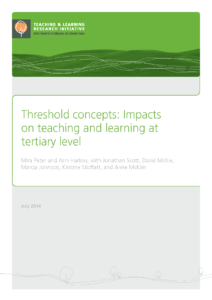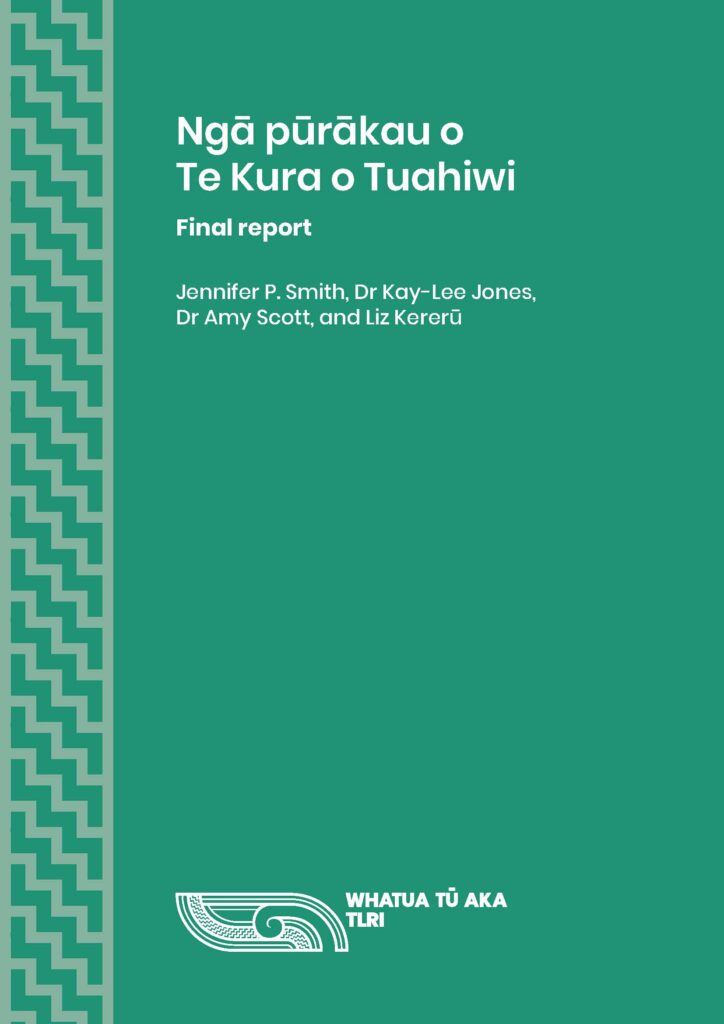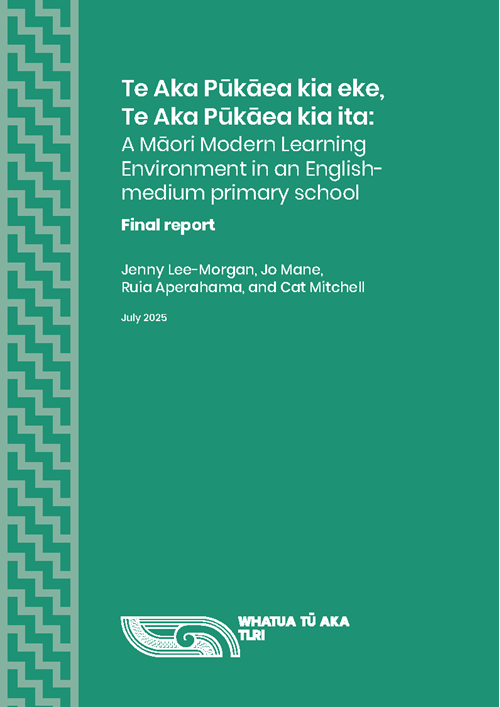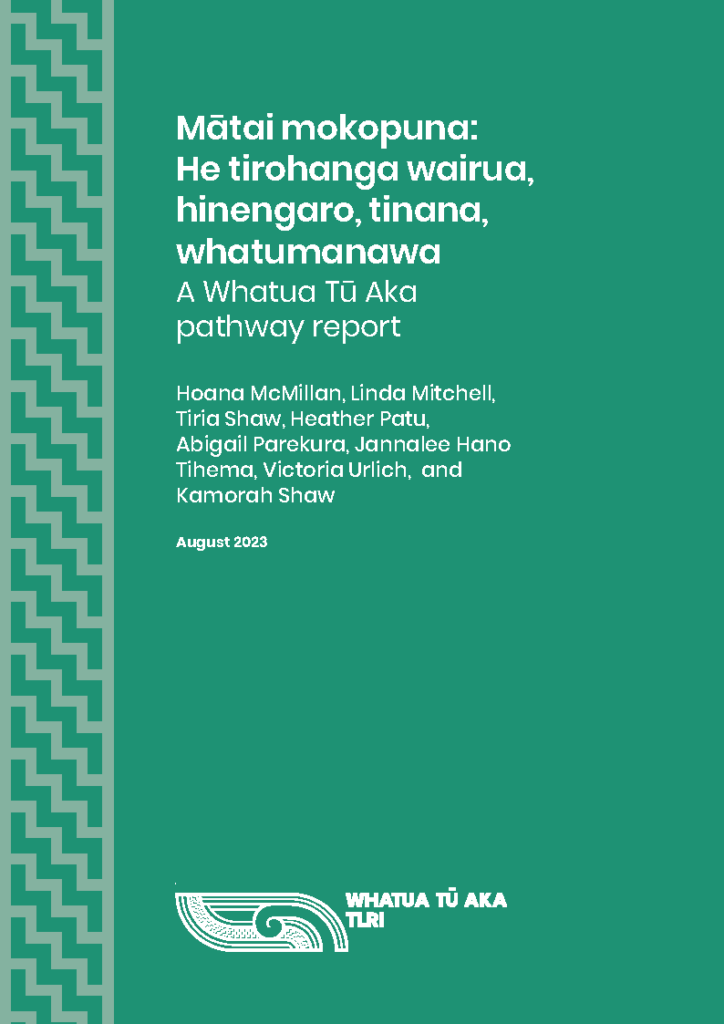Introduction
According to threshold concept theory, in each academic discipline there exists concepts that, once grasped, allow new and previously inaccessible ways of perceiving and thinking about the subject to emerge (Meyer & Land, 2003).
According to Meyer and Land (2005, 2006) there are points in learning threshold concepts at which students experience difficulty because mastering threshold concepts requires letting go of usual ways of seeing and thinking about subject matter. These learning thresholds create a state of ‘liminality’—a space and/or time of transformation from an earlier understanding to a new, required state which “entails a shift in the learner’s ontology or subjectivity”. Acquiring a threshold concept often resembles a phase transition as observed in other dynamical systems (Treffner & Peter, 2002). In all complex dynamical systems, (e.g., physical, biological, cognitive) a relatively sudden shift in system behaviour—phase transition—can arise from continuously changing underlying mechanisms and the many interacting components in the system (Haken, Kelso, & Bunz, 1985; Kelso, 1995; Thelen & Smith, 1994).
Phase transitions and self-organisation are signatures of complex dynamical systems. The physical phenomenon of self-organisation helps us understand how reorganisation of knowledge is possible through multiple interactions between the knowledge-elements and the context in a way that is parallel (all the elements can act at the same time), distributed (no element is a central coordinator), nonlinear (multiple feedback loops are pervasive), and emergent (spontaneous appearance and qualitative shifts in pattern formation). These concepts, phase transition and emergence, can help us understand the qualitative change students experience when they master threshold concepts: where one can observe a new level of complexity—new properties in which the whole (the knowledge and the learner) is very different from the sum of its parts. This transformation and the emergence of a higher level of understanding distinguish threshold concepts from the so-called key concepts. However, students often find threshold concepts troublesome, and this is where they often ‘get stuck’ (Harlow, Peter, Scott, & Cowie, 2011).
This project explored teaching and learning of hard-to-learn threshold concepts in first-year English, an electrical engineering course, leadership courses, and in doctoral writing. The project was envisioned to produce disciplinary case studies that lecturers could use to reflect on and refine their curriculum and pedagogy, thereby contributing to discussion about the relationship between theory and methodology in higher education research (Shay, Ashwin, & Case, 2009).
A team of seven academics investigated lecturers’ awareness and emergent knowledge of threshold concepts and associated pedagogies and how such pedagogies can afford opportunities for learning. As part of this examination the lecturers also explored the role of threshold concept theory in designing curricula and sought to find the commonalities in threshold concepts and their teaching and learning across the four disciplines.
The research highlights new ways of teaching threshold concepts to help students learn concepts that are fundamental to the disciplines they are studying and expand their educational experiences. given that much of the international research in this field focuses on the identification of threshold concepts and debates their characteristics (Barradell, 2013; Flanagan, 2014; Knight, Callaghan, Baldock, & Meyer, 2013), our exploration of what happens when lecturers use threshold concept theory to re-envision their curriculum and teaching helps to address a gap within the field. By addressing an important theoretical and practical approach the project makes a considerable contribution to teaching and learning at the tertiary level in general and to each discipline in particular.
Key findings
The value of a facilitated research process
Facilitated collaborative action research was key to sustaining lecturers’ engagement in researching their own practice and their students’ learning. A focus on threshold concept theory promoted a dialogue between lecturers, and between lecturers and educational researchers, that increased awareness and supported emergent knowledge of threshold concepts. Their collaborative examination of the structure of their various disciplines and the curriculum and pedagogy they were employing made a substantial impact on what and how lecturers taught, and how they assessed students’ understanding of threshold concepts.
Benefits for teaching quality
In searching for strategies to foster and monitor students’ progress in learning, the lecturers developed new pedagogical approaches and assessment tools. They also developed the educational research skills necessary for quality teaching and establishing students as lifelong learners. Lecturers also came to recognise and acknowledge the importance of precursor concepts that learners need to have mastered before they can grasp more difficult threshold concepts.
Benefits for quality of student learning experiences
One of the themes that emerged in all disciplines was that of the value of knowing about student experiences and what it meant for students to be stuck. The project enabled all lecturers to become acutely aware of the impact of their teaching on students’ learning. using this knowledge the lecturers strived to listen and adapt their teaching to their students’ needs. How fast students mastered threshold concepts varied, and this emerged as a strong constraint that lecturers needed to accommodate in order to help students transition from being a novice to being a disciplinary expert.
Phase transitions in lecturer and student learning
The student learning experiences and achievement data support the idea that phase transitions and their anticipatory signatures (e.g., loss of stability) are common across a broad range of complex systems and disciplines, including human learning. our focus was on variability and changes in students’ understanding of threshold concepts. Through deconstructing their curricula, lecturers experienced a phase transition in their own understanding about (teaching) threshold concepts.
Major implications
- Threshold concept theory is an effective tool to re-envision teaching and learning at the tertiary level. It provides opportunities to raise questions about what the important ideas are within a discipline and what it means to be an expert in the field.
- A crucial aspect in students’ learning of threshold concepts is their unsettled understanding over time or “liminal space” experience, and variation in coming to understand troublesome ideas. Thus, it is crucial that lecturers explore disciplinary threshold concepts and determine the implications of how, what, and when they teach these in order to help students cross the threshold to deep understanding.
- Using student-voice data can ensure that lecturers are aware of the interaction between the epistemological (what is learnt and how) and ontological (changes in learner’s identity) aspects of learning and can help them appreciate the challenges students face in mastering threshold concepts.
The research
Background
Internationally there is an interest in how threshold concept theory can transform tertiary teaching and learning—what changes do lecturers make to curriculum and pedagogy when they focus on threshold concepts, and how do tertiary students respond to threshold-concept-informed curriculum? In contrast to the situation overseas, very little research in New Zealand has been conducted within a threshold concept theory framework.
Since the inception of threshold concept theory many researchers in the field have focused on identifying threshold concepts using the attributes identified by Meyer and Land (2003): threshold concepts are transformative (they change the learner’s whole way of thinking), irreversible (they are hard to unlearn, as with riding a bicycle), integrative (they connect into many diverse niches of a discipline), bounded (they mark the edge of a discipline), and they are potentially ‘troublesome’ (difficult to grasp; counter-intuitive). According to Meyer and Land, after initially encountering threshold concepts, students may spend time in a ‘liminal’ state before crossing the threshold to deep understanding—akin to a phase transition (Haken, Kelso, & Bunz, 1985; Stephen, Boncoddo, Magnuson, & Dixon, 2009). until students cross the threshold they are only able to mimic deep understanding and are therefore unable to solve new problems in diverse situations. Threshold concepts have been linked to ontological shifts (Meyer, Land, & Baillie, 2010), changes in identity, and hence understanding of what it means to become, for example, an artist, economist, or engineer. Therefore, it is crucial to uncover why some students find it troublesome to understand and to express knowledge of threshold concepts. It is equally important to determine why and how some students undergo a transformational, or even a creative, experience in the liminal space of learning.
Our project built on our earlier work in which the lecturer in the first-year electrical engineering course identified threshold concepts in electronics engineering and investigated the impact of a threshold-concept-informed curriculum and pedagogy (Harlow, Peter, Scott, & Cowie, 2011; Scott, Harlow, Peter, & Cowie, 2010) on students’ learning. While our early studies focused solely upon electronics engineering, the current project expanded the focus to four disciplines. It also investigated the dialogue between disciplinary experts, and amongst disciplinary experts and education researchers, with the view that such dialogues can inform the examination and development of a threshold concept theoretical framework and practice.
For experts, who have crossed the threshold to deep understanding, threshold concepts are often held as tacit knowledge. Hence the lecturers, being experts in their fields, may not teach them explicitly, and consequently students may not realise their importance. For this reason our project systematically investigated the potential of a focus on threshold concepts across several disciplines to profoundly change tertiary teaching and learning. researchers and lecturers, working together, identified threshold concepts, developed curriculum interventions focusing on threshold concepts, and documented the impact of a threshold-concept-informed curriculum, pedagogy, and assessment on student learning. We explored the affordances (opportunities for action) of various disciplinary teaching practices and students’ perceptions of barriers to learning threshold concepts. We also expanded on our previous work by exploring whether or not there are threshold concepts (higher-order invariant patterns) that are shared across disciplines (meta-threshold concepts).
Research questions
There was a three-fold objective to our study: (1) to engage tertiary lecturers in rigorous examination of curriculum and pedagogy through an exploration of threshold concept theory, (2) to foster in students deep rather than shallow knowledge and understanding through the threshold-concept-informed curriculum, pedagogy, and assessment, and (3) to address concerns around retention of tertiary students. Through four disciplinary case studies and the collaborative teamwork we endeavoured to answer the following questions:
- How does lecturers’ awareness of threshold concepts impact teaching at the tertiary level?
- How does the introduction of threshold concepts into teacher–student discourse and pedagogical practice impact student learning at the tertiary level?
- Are there threshold concepts that span disciplines?
- What value is there for tertiary curriculum and pedagogy design when lecturers from several disciplines collaborate to undertake action research?
Methodology and analysis
Participants
The study made use of facilitated practitioner action research methodology (Carr & Kemmis, 1986; groundwater-Smith, Mitchell, Mockler, Ponte, & Rönnermann, 2013; reason & Bradbury, 2008) across an unusual cluster of disciplines. In addition to two educational researcher facilitators, who were the principal investigators for the project, the research team included five practitioner researchers—four lecturers teaching first-year courses and one lecturer who was a facilitator of doctoral writing workshops. The practitioner researchers were in the university faculties of arts (English—two lecturers), engineering (analogue electronics), management (leadership), and postgraduate education (doctoral writing). All lecturers were experienced practitioners; three were the recipients of tertiary teaching awards. In electronics engineering and in the English course there were between 100 and 120 first-year students enrolled; in leadership courses there were between 15 and 45 students (both first-year students and students enrolled in corporate education courses); and in the doctoral writing group there were between 10 and 25 students.
Procedure: lecturer practitioner research
The study proceeded through two cycles of participatory and collaborative action research (Elliot, 2009; McNiff, 2002; Saunders & Somekh, 2009). The first cycle started with identification of points in a curriculum where students got stuck and a discussion of threshold concepts, how experts think and practise in different disciplines, and consideration of students’ learning patterns (Cano & Berbén, 2009) and variability in learning (Meyer & Land, 2003, 2005, 2006). This phase was followed by revising the curriculum and pedagogy (teaching to the concept), developing and implementing new teaching strategies, collecting data on student perceptions and formal measures of achievement, and evaluating the outcomes—individually and within group discussions.
Before the start of the first teaching semester, each lecturer was interviewed individually to gain baseline data on the challenges they perceived as they approached the teaching of subject-specific threshold concepts. The day after the lectures in which threshold concepts were introduced, researchers interviewed lecturers, focusing on their perceptions and experience of explicitly teaching threshold concepts. video-stimulated reflective dialogue was used with lecturers in the electronics engineering and the English courses to explore their perceptions of the impact of their teaching when they had been consciously focusing on threshold concepts.
At the end of their courses lecturers were interviewed about the changes they had made in their teaching. Interviews were followed by half-day workshops held for researchers and lecturers to discuss findings and explore the possibility of threshold-concept-related themes across disciplines. The outcomes of these discussions informed lecturers’ revisions of their course materials and teaching programmes for the second year of the project, which involved a similar cycle of action research and data collection. At the end of the second year, the research group hosted an international conference on threshold-concept-related pedagogies https://education.waikato.ac.nz/elTc/ where findings from the project were disseminated to the threshold concept research community.
Procedure: Student data
At the start of each semester, students in each study class (except in doctoral writing) were surveyed about the concepts identified by their lecturer as threshold concepts. The surveys also asked students about their preferred ways of learning, views on troublesome knowledge, and early understanding of the discipline. online surveys for PhD students at various stages of their programme were open to both national and international students and asked about where they got stuck during their thesis writing and strategies they used to overcome the problems.
Focus-group interviews explored students’ ideas about troublesome knowledge and changes in students’ understanding of threshold concepts following the introduction of threshold-concept-based teaching. Individual interviews with PhD students at various stages of their programme focused on their experience with troublesome/stuck points in doctoral writing.
End-of-course student surveys were administered to compare students’ perceptions of threshold concepts, learning strategies, and strategies used to get ‘unstuck’ with baseline data, and to relate students’ perceptions to their achievement—when final exam grades became available.
A focus-group discussion between analogue electronics PhD students and their advisor (the electronics engineering lecturer) was held on two occasions. As a result of these discussions the mid-semester test and the final exam questions for first-year students were redesigned to reveal areas where students got stuck and their answering strategies.
Analyses
Quantitative and qualitative data analysis focused on identifying changes in students’ understanding of threshold concepts and their perceptions of threshold-concept-centred teaching. Quantitative data analyses also sought to establish the relationship between students’ views about their understanding of threshold concepts and their achievement data on these concepts and overall.
Qualitative data from interviews with lecturers and research team discussions were transcribed and thematically analysed (Mutch, 2005; Patton, 2002). observations and student and lecturer commentary were integrated to develop descriptive case studies of how teaching of threshold concepts played out and to provide insight into the responses of some students to this teaching. Data drawn from observations of lectures, workshops, tutorials and laboratory sessions, interviews, student surveys and focus-group discussions, achievement results, camera stills, relevant document analysis and recourse to university-based Moodle[1] information collected over the 2 years were analysed and synthesised and formed the basis of publications in each discipline. The qualitative data employed an inductive grounded theory approach in order to remain open to the unexpected and the unpredictable, which is particularly important in research (Charmaz, 2005; Creswell, 2005). grounded theory analysis assists with keeping researchers responsive to what emerges in the data.
Findings—impact on teaching
The lecturers’ experience of identifying threshold concepts
According to cousin (2008) the search for threshold concepts can create a form of ‘transactional curriculum inquiry’. In the first phase of the project lecturers identified threshold concepts in their disciplines and interrogated their previous experience with teaching concepts that they found easy to understand yet difficult to teach effectively (because students often failed to understand the ideas). Through group discussions lecturers realised that these concepts were where students got stuck and that some students remained in the liminal space longer than others. However, there was no consensus on whether threshold concepts could be found in every discipline; whether they should be thought of as concepts, competencies, or experiences; or whether they constitute a single entity or a cluster of interconnected competencies. It also became evident that thinking about and identifying threshold concepts in one’s discipline was ‘easier’ and more productive when discussing the existence of and the nature of potential threshold concepts with lecturers from different disciplines.
Based on findings from the first year of teaching all lecturers refined their definition of what was ‘threshold’ in their courses, and some revised the list of potential threshold concepts in their discipline. In particular, the electronics engineering lecturer developed a threshold concept inventory for use in electronics engineering (Scott, Harlow, & Peter, 2014).
Teaching to the threshold concept
One of the themes that emerged at the start of the project, and continued to be reflected upon throughout, was the significance of the students’ experience of encountering threshold concepts. The challenge for lecturers was to ensure that students reflected on their learning difficulties when they encountered unfamiliar but discipline-critical concepts. This finding resonates with Land’s observation (2011) that identifying the source and nature of the conceptual or other difficulties experienced by students can help them move from their stuck places.
Discussions about the nature of threshold concepts and ways of teaching them emerged early on in the project. The leadership lecturer was inspired to apply ideas from complexity theory (Haken, 1987) and work on phase transitions (Haken, Kelso, & Bunz, 1985) to the development of students’ understanding of leadership threshold concepts. He suggested that threshold concepts may actually consist of many interlaced segments, which led to the team trialling a variety of pedagogical strategies when teaching threshold concepts (Baillie, 2012). The innovative pedagogical and assessment strategies developed differently in each discipline.
English: In order to help students grasp the concept of subjective interpretation, one of the English lecturers organised a performance of a literary text in which students, as the audience, took on different roles when asked to participate. In this way students were given the opportunity to experience a text from different perspectives (i.e., uncover the affordances of the text) and the cognitive activity of understanding a particular threshold concept became embodied—it took place in the context of a real-world environment and it inherently involved perception and action (Moffatt & McKim, in press).
Leadership: In his search for threshold concepts in leadership the lecturer identified ‘life-changing experience’ as a potential candidate. While examining the curriculum and ways of teaching the lecturer re-examined all his courses by exploring threshold concepts in relation to other leadership concepts and skills. The lecturer designed a series of surveys to be completed by students throughout the semester, giving him the opportunity to examine possible clusters of concepts, around threshold concepts, to track students’ learning.
Electronics engineering: The lecturer focused his teaching on being explicit about the identified threshold concepts in his course; he came to believe that threshold concepts were “probably the only ideas that teachers need to address”. He made use of Instant Feedback Assessment Technique (IF-AT) (Epstein et al., 2002) for formative assessment of both threshold concepts and their underlying or precursor concepts in order to uncover where exactly students get stuck (Harlow et al., 2011). He designed a threshold concept inventory and validated this by examining student assessments to see if students who provided correct responses on threshold concept questions also had precursor-concept knowledge (Scott, Harlow, & Peter, 2014; Scott, Peter, & Harlow, 2012). online tutorials were then developed to replace face-to-face tutorials. examples were especially crafted to help students understand threshold concepts (Scott, Balsom, round, Peter, & Harlow, 2013).
Doctoral writing: Drawing on survey and interview data with doctoral students in New Zealand, Canada, and the United States, the lecturer identified two threshold concepts related to doctoral research writing (Johnson, 2013). The first concept, “talking to think”, encompasses the idea that academic writing includes more than the mechanical presentation of words on a page. The second, “developing self-efficacy”, includes the ability to understand research practices, extract meaning from data, clearly articulate ideas (talk), and then present, shape, and reshape text on the page. Writing also includes a belief that understanding will emerge as new ideas are discussed, clarified, written, and refined. As a result of these findings, the lecturer incorporated into the Doctoral Writing conversations programme activities that focused on identified threshold concepts (e.g., “research methods: What do you need to consider before, during, and after data collection?” and “understanding how to interpret and report your research data—myths and misconceptions”).
I am seeking deeper insight into which strategies can be effective for building the types of writing and thinking competencies doctoral students need in order to make progress and finish. (Doctoral writing lecturer)
Findings—impact on learning
Students’ grasp of threshold concepts
The English course
Analysis of student survey and focus-group data revealed that subjective interpretation and related concepts were valuable in terms of unlocking and validating students’ voices and perspectives, and in helping them to identify connections between a wide variety of texts and other media. Students expressed their appreciation for being introduced to a threshold concept that they could then apply both to learning other university subjects and to their own creative endeavors; for example, dancing, music, and creative writing.
I think you simply can’t advance in the humanities without the ability to subjectively analyse something … In one or two papers, like anthropology, you can use subjective interpretation to interpret other things, like the cultural use of rituals … (English student)
Students found the lecturers’ various pedagogical approaches to threshold concepts helped their learning and their ability to situate their voice within a variety of perspectives. Students’ experience of participation in a collective exercise through movement and vocalisation and taking part in a performance helped them grasp the concept of subjective interpretation and recognise its importance, and also promoted shifts in their understanding:
You got to see different interpretations of the idea. In The Tempest, when they changed the characters around and they acted like melodramatic characters and changed their personalities completely, and then we kind of sided with one of the characters. (English student)
In the English course, students’ grasp of threshold concepts was examined in assignment 1 in 2012 and 2013, a compulsory exam question in 2012, and an essay question and a test in 2013. As can be seen from Figure 1 and Figure 2, in both years of the project students grasped the identified threshold concepts to a greater degree at the end of the course than at the start. According to the lecturers, this shift in student understanding was greater than in previous years. They attributed this shift to the pedagogy explicitly focusing on threshold concepts.
In the final exam in the first year of the project there was a 100% pass rate on the compulsory threshold concept question on subjective interpretation. The correlation between students’ answers on the threshold concept question and the total year grade was positive and strong, r = 0.7. When asked what had helped their understanding of subjective interpretation, more than 80% of students identified assignments, lectures, and group discussions that had been developed during the study. The majority of students stated that, of the concepts covered in the course, they best understood perspective (87%) and subjective interpretation (73%). unexpectedly, 45% of students found the unreliable narrator concept the most troublesome. Following these findings, the lecturers focused on this additional threshold concept in the second year of the project.
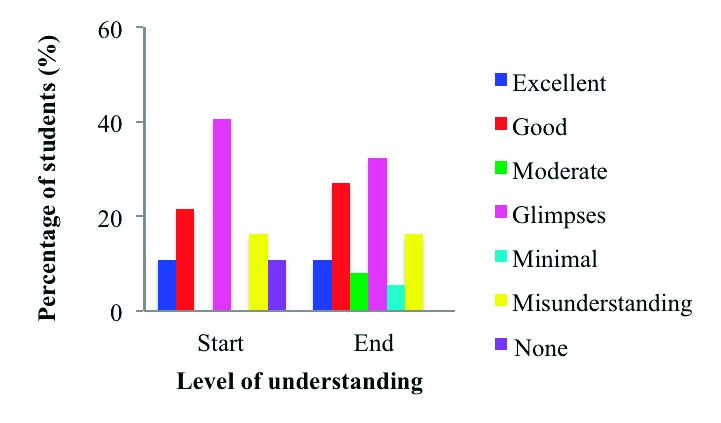
Figure 2 shows that students’ achievement in 2013 was comparable to 2012. There was a 100% pass rate on the threshold concept question on subjective interpretation in assignment 1; of 85 students who submitted an essay, 23.5% achieved an A/A+ grade, and 80% of students passed the final exam.
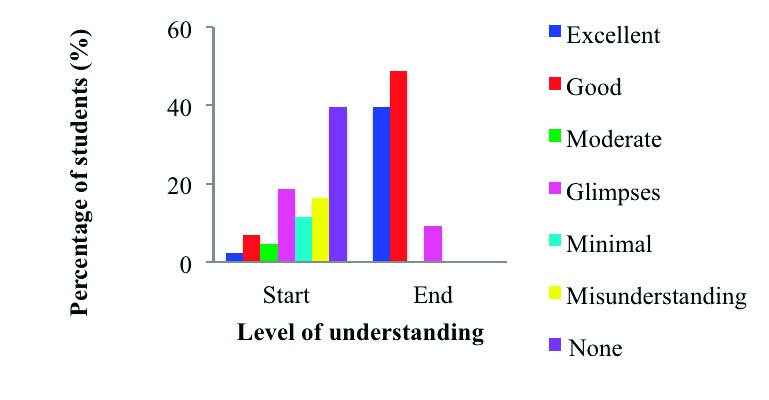
In sum, through a variety of teaching techniques, including participation in a collective exercise, students were enabled to grasp the concept of subjective interpretation and experience shifts in understanding through active learning. This was evident in students’ application of concepts via repeated references to subjective interpretation, limited point of view, and unreliable narrator in exam scripts—even when questions did not explicitly invite this—thus demonstrating critical thinking, awareness of subjective points of view, and the role of critical evaluation.
Leadership
Student survey data were collected at the start of each leadership course to examine students’ understanding about leadership. At the end of each course students’ reflective essays were analysed with regard to students’ progress in understanding the identified threshold concepts. According to the lecturer, despite more explicit teaching of threshold concepts, there were no clear indications that students’ ideas about leadership had changed any more than they usually would have.
Survey and essay data indicated students in the two first-year classes experienced change in their understanding of what leadership is about, and gained insight into what a good leader does in order for their vision for the group to be realised. However, as most of the students had come straight out of high school, they had difficulty in understanding what these actions would look like in real-world situations (see Figure 3). They also found it hard to comment on their own leadership style, since many had not yet held a leadership position. Many relied on self-assessment tests to gauge their leadership style, while some found group exercises useful. The first-year students found the course changed their ideals about leadership and their beliefs in themselves as leaders as well as giving them a greater sense of self-awareness.
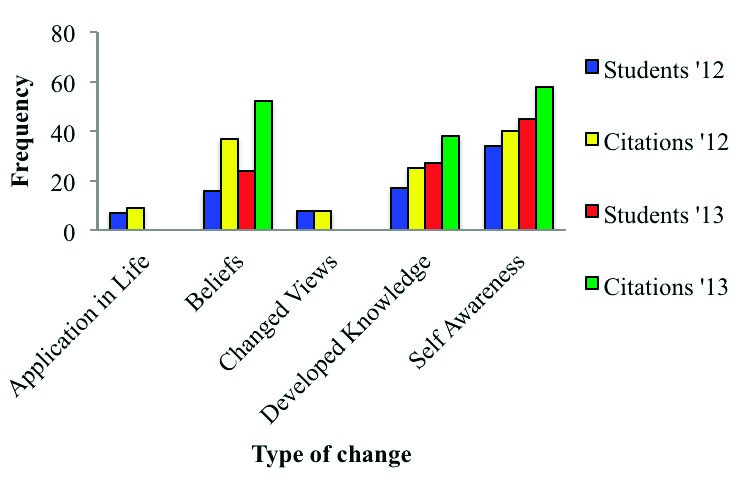
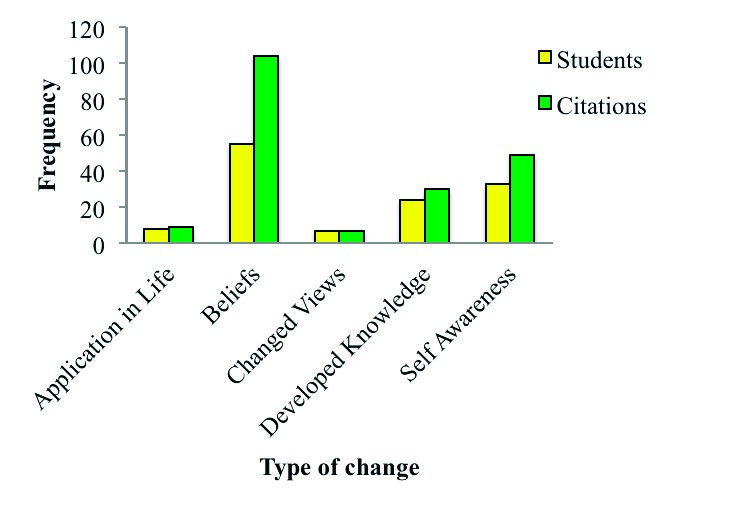
The summary of reported changes in corporate students’ views on leadership is illustrated in Figure 4, and for Māori corporate students in Figure 5. Many students in the corporate courses struggled to find ways to adapt their current leadership style, especially if they had been working in a leadership role for many years. They recognised the need for a change, but were not sure how to achieve it. This course enhanced their understanding of leadership, building on current knowledge and giving new insights into that knowledge by the use of class discussions, group exercises, assessments, and self-assessment tests. Their changed views of leadership related to their beliefs around good leadership, their role as a leader, and the roles of others in leadership. Although these ideas/concepts were not named in the preliminary list of threshold concepts, they do align with such named threshold concepts as ‘the job of leaders is to create leaders’.
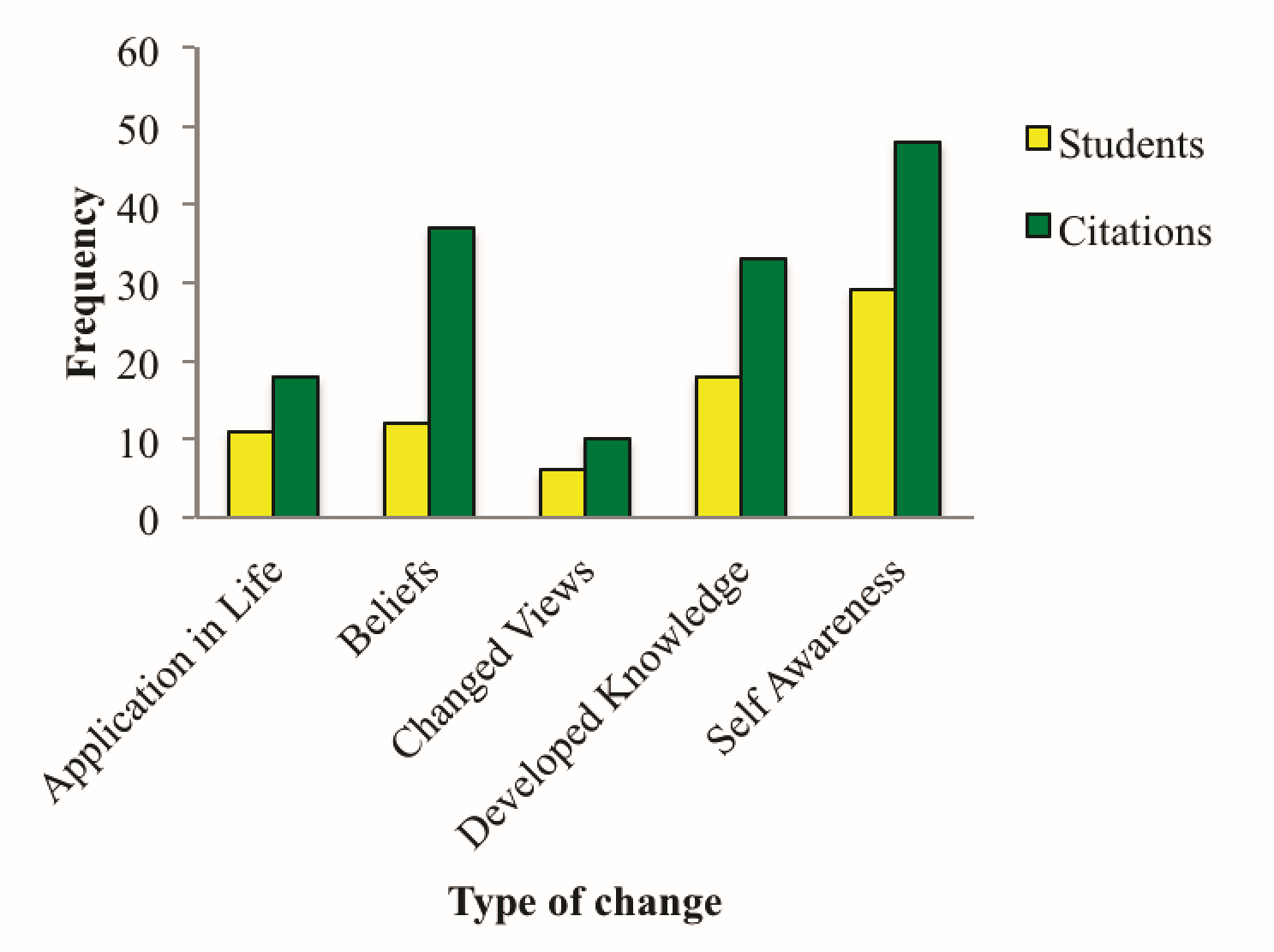
In sum, leadership coursework modified perceptions of leadership for both novice and expert groups of students. As evidenced in their essays, for many students perceptual change did not translate immediately into an ability to see how to become a leader or a better leader. This indicates that students may still be in an unstable, liminal state of learning (Meyer & Land, 2003). As the lecturer believes, “relentless execution” of thinking about the leadership role may be required for a transformation of leadership practice.
Doctoral writing
Research has identified that students frequently start their doctoral studies with scant understanding of the hurdles they will face, culturally, linguistically, or educationally (Cadman, 2000). There is an emerging body of research evidence that argues for the efficacy of cohort models of supervision and writing groups (Ali & Kohun, 2007; Larcombe, Mccosker, & O’Loughlin, 2007). Such models, by their very community-based orientation, change the physical and conceptual spaces in which doctoral students meet and work. The Doctoral Writing conversations programme facilitated by the lecturer encompassed this philosophy. Interviews with students and data from an online survey revealed that doctoral students get stuck in variety of ways when writing their thesis:
There were many instances [of “stuckness”] and particularly around the literature review and finding a conceptual framework. (New Zealand PhD student)
The writing has been a lot more difficult than I expected it to be. [Why?] Well, putting it all together and getting a structure. (New Zealand PhD student)
Interviews with students revealed that students often felt underprepared to undertake doctoral study, lacked the confidence to be an independent researcher, and wanted better institutional support. lack of understanding of what “writing” actually means, and a lack of confidence in being able to structure ideas and present them at the required level, emerged as most troublesome.
Using the insights from students’ and advisors’ interviews, the lecturer revised the Doctoral Writing conversations programme to include more shared conversations and disciplined practice, which assisted in building a collaborative postgraduate writing culture. This contributed to students’ sense of personal wellbeing, achievement, and academic success:
They [writing groups] help me to realise that other people also have the same problems as I do. They provide me with useful ‘tips’ or strategies to make progress. They allow me to voice myself. (New Zealand PhD student)
Insights from the research helped the lecturer to help students identify and make explicit what it means to be a doctoral writer. This included, for example, understanding that writing incorporates the ability to understand research practices, extract meaning from data, clearly articulate ideas, and present, shape, and reshape text on the page. understanding writing also means developing an enhanced tolerance of ambiguity while searching for meaning, and includes a belief that understanding will emerge as ideas are discussed, clarified, written, and refined.
Electrical engineering course
Results from the first year of the study pointed to the importance of students understanding precursor ideas in order to understand related threshold concepts: if a concept relies upon an earlier idea, lack of understanding of that earlier idea can result in troubled learning of the new idea. For example, exam results revealed that few students (16%) had a complete understanding of the precursor knowledge required for an understanding of one the threshold concepts (Thévenin’s theorem[2]), and so most students provided an incorrect answer to questions, including Thévenin’s theorem questions, requiring an understanding of precursor concepts. Students who answered the threshold concept questions correctly in quiz 1 but failed to get the precursor questions correct acknowledged, in an interview, that they had guessed the answer to the threshold concept questions. Interestingly, perceived level of understanding of the threshold concepts was not related to students’ final grade—both students who perceived their understanding of a threshold concept to be low and those who judged it to be high achieved equally well: that is, their final grades did not differ significantly. However, analysis of students’ achievement on the threshold concept questions revealed that on three out of five questions a significantly greater proportion of students who rated their understanding of Thévenin’s theorem as excellent or very good more frequently answered those questions correctly than the other two groups of student, (100% vs. 52% and 87%, c2(2) = 14.53, p < 0.05; 71% vs. 33% and 42%, c2(2) = 5.55, p = 0.06; and 93% vs. 78% and 42%, c2(2) = 12.74, p < 0.01). Students who understood precursor concepts and had grasped the threshold concepts early in the course were more likely to achieve well in the final exam. This finding influenced the lecturer to focus on early assessment of precursor and threshold concepts.
Overall, findings from the first year indicated that travel through the liminal space can be supported by an explicit and sustained focus on threshold concepts (Harlow, Peter, Scott, & Cowie, 2014).
In the first year of the project students’ comments highlighted the need for learning examples to be progressively more complex and to be varied to require the learner to use new knowledge in different contexts. Hence, in response to students’ requests, an online tutorial system was developed in the second year of the study. The analysis of student activity indicates that students use online tutorials both for initial learning (to pass the tutorial) and to review questions. The majority of students went through waves of activity that peaked prior to assessment points, such as before the week 4 and 12 quizzes, and before the final exam in week 16. There were a number of students who regularly (i.e., every week) visited online tutorials (see Figure 6).
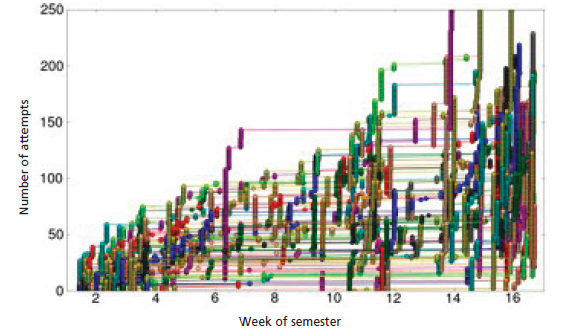
As can be seen in Figure 7, on the midterm exam (quiz 1), students from the 2012 cohort and those from the 2013 cohort achieved, on average, equally well (74% vs. 73%).
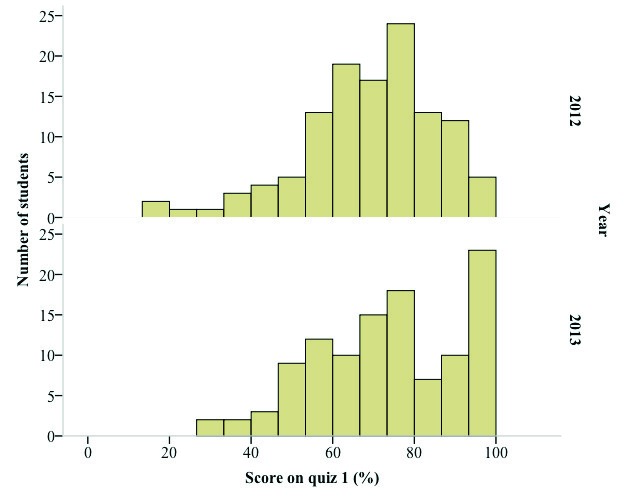
However, in 2013 students’ final exam scores (M = 49.32%) were significantly higher than the students’ scores in 2012 (M = 42.76%), F(1, 225) = 12.57, p < 0.001. This significant difference, combined with the lack of difference in their achievement in the midterm exam, was taken to indicate that the use of online tutorials, together with other changes in lecturer’s pedagogy, had a beneficial effect on student learning. Students take a mid-term exam at the end of week 4, immediately after learning about Thévenin’s theorem (i.e., the identified threshold concept). According to threshold concept theory, mastering threshold concepts, such as Thévenin’s theorem, takes time and consequently it would be “too early” to detect any difference between the two groups on the midterm exam. yet, by the time of the final exam differences in mastery of a threshold concept could potentially be detected since students had more time develop deeper understanding of the threshold concept.
Moreover, in 2013 there was also an indication that there were two distinct groups of students—those who got it (threshold concepts) and those who did not (see Figure 8).
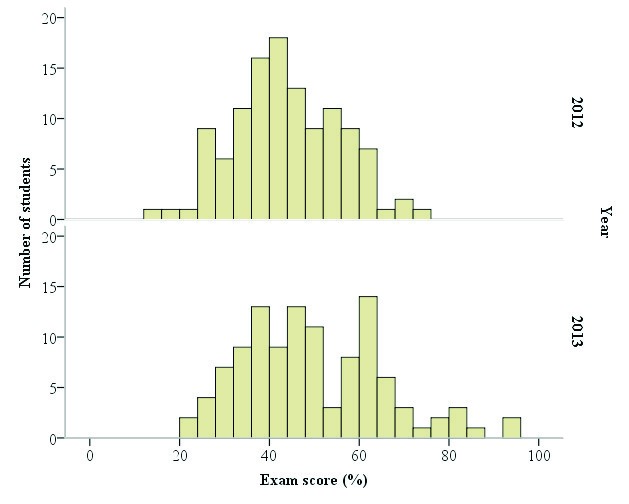
About 20% of students did not complete the eight sections covering analogue electronics in the online tutorials. on average, these students achieved significantly lower scores on the final exam (37.53%) than the students who completed eight or more online tutorial sections (51.53%). However, as Figure 9 illustrates, even among those students who completed eight or more online tutorials, about 50% did not achieve high scores on the final exam. This finding, together with the survey results in which over 50% of students said that they still did not understand the two threshold concepts halfway through the course, suggest that these concepts represent troublesome learning and place students within an unstable, liminal knowledge space where understanding of these concepts is partial and depends on context. This is expressed in one student’s comment:
Sometimes Thévenin and Dynamic resistance are easy to grasp and apply, other times not so.
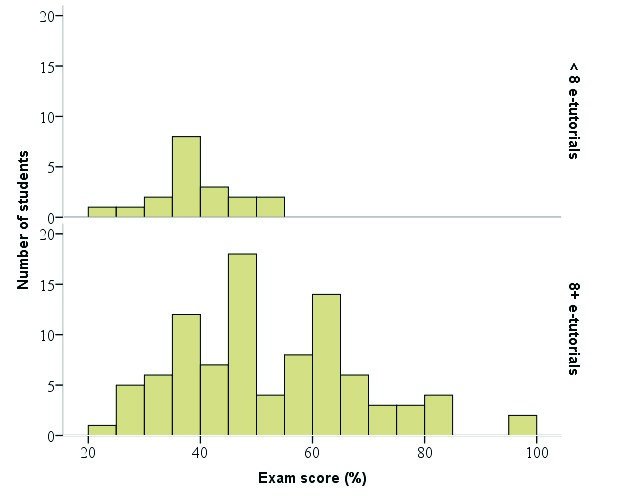
In 2013, interviews with students and a student survey provided evidence that the online tutorials had improved student engagement by accommodating students’ different patterns of learning. As can be seen in Figure 10, the majority of surveyed students thought that online tutorials provided them with many and varied examples of problems that could be worked on in their own time. Students found that working with these examples provided immediate feedback, was an efficient way to learn, and allowed them to review wrong answers.
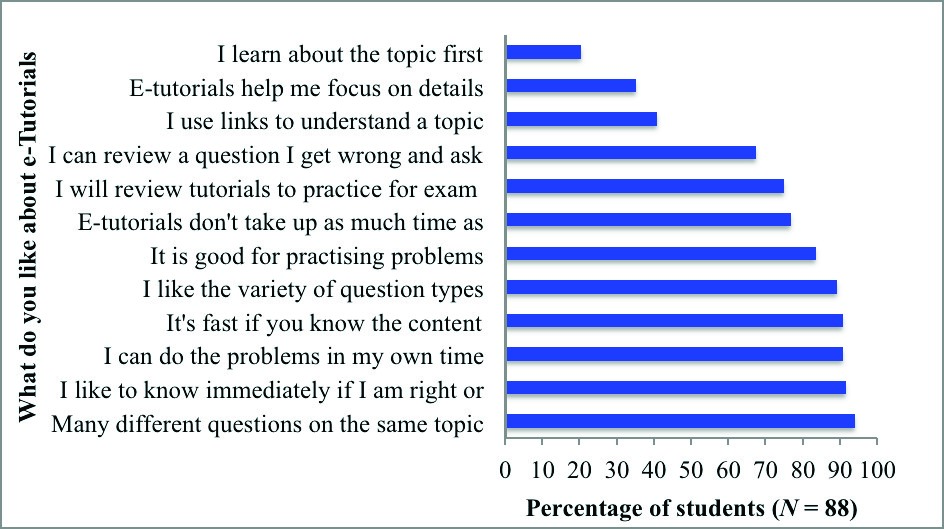
In sum, results showed that students in electrical engineering—and all other disciplines—became aware of the importance of threshold concepts; experienced the liminal space in learning, where they oscillated between knowing and not knowing; and were passing through a portal of understanding at varied rates and by means of varied teaching strategies.
Discussion of key findings
Quality teaching
Research question 1: How does a lecturer’s awareness of threshold concepts impact teaching and supervision at the tertiary level?
Shared findings provided lecturers with an insight into their own teaching and supervisory practice and signalled potential models and pathways for pedagogical change to make difficult knowledge more explicit and accessible to students. By thinking about, observing, and discussing their teaching using a threshold-concepts lens, lecturers became aware that they needed to modify their teaching to accommodate students’ varying rates of mastering threshold concepts. over the 2 years, the lecturers engaged in debate and deliberation as to how a focus on threshold-concept-theory-informed pedagogy could enable students to move through the seemingly necessary liminal space with relative ease. Some approaches included encouraging discussion and gathering feedback on student ideas during teaching.
Quality learning
Research question 2: How does the introduction of threshold concepts into teacher–student discourse and teaching practice impact student learning at the tertiary level?
Student data revealed that students had problems not only with lecturer-identified threshold concepts but also with some other (threshold) concepts. These were subsequently given a special focus and taught explicitly. Students found the electrical engineering lecturer’s focus on assessment for learning (Black, Harrison, lee, Marshall, & Wiliam, 2003) useful for their understanding of threshold concepts. leadership students viewed group formative assessment as valuable in helping them articulate their knowledge and become more confident in their learning. engaging learners in enacting learning tasks, as in the English course, encouraged their enthusiasm and understanding of troublesome concepts. However, the direct impact of changed teaching practice on student short-term learning could not always be clearly identified. nevertheless, results from student surveys indicated that students’ learning experience had been enhanced in all four disciplines. recently, Knight et al. (2013) reported that identifying a threshold concept through dialogue between students and lecturers about conceptual understanding and capabilities can result in changing pedagogies and assessments to focus on students’ conceptual understandings, and thus enhance students’ awareness of their cognitive strategies and promote their confidence and problem-solving abilities. our findings support this view.
Phase transitions in understanding
Research question 3: Are there threshold concepts that span disciplines?
The research team discussions did not reveal any particular overarching threshold concepts, however, it became clear that the characteristics of threshold concepts could be applied to a greater or lesser extent to different threshold concepts in each discipline. All lecturers focused their attention on the transformative power of threshold concepts and their troublesome nature. The other characteristics (integrative, bounded, and irreversible) became evident in later stages of the project. Through deconstructing their curricula and reflecting on this together, lecturers felt that they experienced a phase transition in their own understanding about (teaching) threshold concepts. lecturers’ main realisation was that trans-disciplinary investigation of threshold concepts could provide a fertile context within which lecturers can alter their understanding of their own discipline, their teaching, and their students’ learning. The leadership lecturer commented:
I am interested in the similarities and differences … It is like you don’t understand your own country till you leave it. you don’t understand threshold concepts in your own field until you have an idea of how it might work in another field.
The electrical engineering lecturer said there had been a phase transition in his thinking about his own doctoral students as a result of discussions with the doctoral writing lecturer and the English lecturers:
I look at some of my doctoral student work and think, “This guy has almost got it—he may not have done enough work, but I see that the brain is there. They flip, it is a phase change …” … I would love to use the English lecturers’ idea of subjective interpretation. I’d like to find a way of forcing the engineers to get that threshold concept because they are missing it …
The leadership lecturer also used the concept of phase transition in his discussion of the transferability of his threshold concepts from one discipline to the other:
I’m not sure that my findings will be transferable but do wonder if some concepts like maturity, as a phase transition, may be common during a range of undergraduate courses. For example, if something like post-subjective interpretation were found in English, such as a sense of knowing what a personal judgment was and how to have a meta-perspective on that, would it have an equivalent in leadership and elsewhere?
It is possible that the combination of discussions about threshold crossing and phase transitions provides two complementary means to examine the notion of transformative change.
The facilitated action research process
Research question 4: What value is there for tertiary curriculum and pedagogy design when lecturers from several disciplines collaborate to undertake action research?
Facilitated collaborative practitioner action research (groundwater-Smith et al., 2013) was key to sustaining lecturers’ engagement in researching their own practice and their students’ learning. Threshold concept theory as a common theoretical framework enabled lecturers to examine their own discipline and ask what was essential. It prompted them to examine their pedagogy and the nature of the learning process in their discipline. each discipline brought something different to the discussion. understanding examples from other disciplines required and enabled clarification of thoughts about the teaching and learning. In all cases, crossdisciplinary discussions helped lecturers consolidate their understanding of threshold concepts and where they fitted into their curricula, and it helped them develop new ways to re-design their courses and pedagogy to make threshold concepts explicit to students. The leadership lecturer’s comment best illustrates lecturers’ experience:
From a common frame we went each our own way then came together again. What have we learned as a group—it is quite metaphoric, it took a lot of time without getting much clarity—how can I relate to it? I like to get beyond troubling things.
given that the research questions spanned disciplines, the interaction among the participants meant that the knowledge developed and gained was socially accountable (gibbons et al., 2010). The knowledge developed through partnership between researchers and lecturers has been cumulative and has engendered growth in the research capacity of lecturers. The education researchers deepened their understanding of pedagogical challenges and the use of threshold concept theory as a tool to investigate learning and teaching at tertiary level.
The results from this project suggest that the focus on threshold concepts and cross-disciplinary discussions can influence the personal development of tertiary lecturers. our results complement those of carmichael (2010) showing that collaboration among lecturers, within and between faculties, and between lecturers and students, is closely linked to classroom revisions and changes that affect, and improve, the student learning process. The facilitated research process enabled practitioners in this study to continue to use action research methodology in their ongoing inquiry into their pedagogy beyond the project (Avgitidou, 2009; Jaipal & Figg, 2011; Platteel, 2010).
Limitations
The project had the following limitations:
- This study included four disciplines and a possible limitation of this study is the non-inclusion of relevant ideas and perspectives from lecturers in other fields. To mitigate this limitation, the team hosted an international conference at the end of the project to share findings with other researchers in the field (see https://education.waikato.ac.nz/elTc/).
- The extent to which the findings are generalisable is not certain. However, both students’ and lecturers’ experiences were similar across disciplines, indicating that threshold concept theory is a useful lens through which to engage tertiary lecturers in re-envisioning their curricula.
Guidelines for practice
- Threshold concept theory is an effective tool to re-envision teaching and learning at the tertiary level. It provides opportunities to raise questions about what the important ideas are within a discipline and what it means to be an expert in the field.
- A crucial aspect of teaching threshold concepts is understanding that, in the process of mastering them, students move through a liminal space in which they have a partial and unsettled understanding, and that they vary in how fast they come to fully grasp these troublesome ideas. Thus, it is crucial that lecturers explore disciplinary threshold concepts and determine the implications of how, what, and when they teach in order to help students cross the threshold to deep understanding.
- using student-voice data can ensure that lecturers are aware of the interaction between the epistemological and ontological aspects of learning and can help them appreciate the challenges students face in mastering threshold concepts.
Conclusion
This research has added to dialogue about the relationship between theory and methodology in higher education research (Shay, Ashwin, & case, 2009). lecturers’ new ways of thinking about the curriculum they teach, their identification of threshold concepts within the curriculum, and their explicit teaching of these concepts helped their students make sense of material that is challenging but essential for a deep understanding of their discipline. It is hoped that our findings will encourage tertiary lecturers to collaborate in cross-disciplinary ways and explore their curricula and practice using threshold concept theory.
Footnotes
- Moodle is a web-based learning platform designed to provide educators, administrators and learners with a secure and integrated system to create personalised learning environments. It provides a flexible tool-set to support both blended learning and 100% online courses. Moodle is provided freely as open Source software, under the gnu general Public license. http:// docs.moodle.org/27/en/About_Moodle ↑
- Thévenin’s theorem is the first example of circuit modelling that students encounter in electronics and circuit theory. It causes learners an inordinate amount of trouble. It is not Thévenin—any model would present the difficulty. ↑
Publications from this study
Harlow, A., McKie, D., Cowie, B., Peter, M. Threshold concept theory as an enabling constraint: A facilitated practitioner research study. Manuscript submitted for publication. Educational Action Research Journal.
Harlow, A., Peter, M., & Scott, J. (2012). Threshold concept knowledge in analogue electronics: Support and assessment. In ENZCon 2012: Conference proceedings (pp. 1–6). retrieved from enzcon.org.nz/Past_Proceedings/Proceedings_2012.pdf
Harlow, A., Peter, M., Scott, J., & Cowie, B. (2014). Students’ perceptions of travel through the liminal space: lessons for teaching. In C. O’Mahony, A. Buchanan, M. O’Rourke, & B. Higgs (eds.), Threshold concepts: From personal practice to communities of practice: Proceedings of the National Academy’s sixth annual conference and the fourth biennial threshold concepts conference (pp. 62–67). Retrieved from http://www.nairtl.ie/documents/ePub_2012Proceedings.pdf
Johnson, e. M. (2013). “Previously I thought writing was writing”: reflections on doctoral writing spaces. In S. Frielick, n. Buissink-Smith, P. Wyse, J. Billot, J. Hallas, & e. Whitehead (eds.), Research and development in higher education: The place of learning and teaching, Volume 36 (pp. 233–242). Milperra, nSW: Higher education research and Development Society of Australasia, Inc.
Moffatt, K., & McKim, A. (in press). Transforming conceptual space into a creative learning place. Arts and Humanities in Higher Education.
Peter, M., McKim, A., Harlow, A. (eds.). Special edition of the Waikato Journal of Education. [Three team members plan to edit a special issue of this journal for publication in November 2014. The call for papers has resulted in abstracts from all team members as well as five other abstracts written by presenters at ELTC in November 2013.]
Scott, J. (2012). At the threshold of understanding. Rethink: Research, innovation and entrepreneurship at the University of Waikato, Spring, 4.
Scott, J., & Harlow, A. (2012). Identification of threshold concepts involved in early electronics: Some new methods and results. Australasian Journal of Engineering Education, 18(1) 61–67. retrieved from http://www.engineersmedia.com.au/journals/aaee/pdf/AJee_18_1_ ScottF2.pdf
Scott, J., Balsom, T., round, H., Peter M., & Harlow, A. (2013). Threshold-concept inspired etutorials in electronics. In R. Hasan (ed.), Proceedings of the 20th Electronics New Zealand conference (pp. 127–132). retrieved from http://enzcon.org.nz/Past_Proceedings/ Proceedings_2013.pdf
Scott, J., Harlow, A., & Peter, M. (2014). Towards a TCT-inspired electronics concept inventory. In C. O’Mahony, A. Buchanan, M. O’Rourke, & B. Higgs (eds.), Threshold concepts: From personal practice to communities of practice: Proceedings of the National Academy’s sixth annual conference and the fourth biennial threshold concepts conference (pp. 113–117). Retrieved from http://www.nairtl.ie/documents/ePub_2012Proceedings.pdf
References
Ali, A., & Kohun, F. (2007). Dealing with social isolation to minimize doctoral attrition: A four stage framework. International Journal of Doctoral Studies, 2, 33–49.
Avgitidou, S. (2009). Participation, roles and processes in a collaborative action research project: A reflexive account of the facilitator. Educational Action Research, 17(4), 585–600.
Baillie, c. (2012). Engineering thresholds: An approach to curriculum renewal—sample workshop booklet. retrieved from http://www.ecm.uwa.edu.au/__data/assets/file/0015/2244012/PP10-1607_uWA_Baillie_Final-report_reSource_sample-workshop-booklet.pdf
Barradell, S. (2013). The identification of threshold concepts: A review of theoretical complexities and methodological challenges. Higher Education, 65, 265–276.
Black, P., Harrison, c., lee, c., Marshall, B., & Wiliam D. (2003). Assessment for learning: Putting it into practice. Maidenhead, UK: Mcgraw-Hill Education, Open University Press.
Cadman, K. (2000). ‘voices in the Air’: evaluations of the learning experiences of international postgraduates and their supervisors. Teaching in Higher Education, 5(4), 475–491.
Cano, F. & Berben, A. B. g. (2009). university students’ achievement goals and approaches to learning in mathematics. British Journal of Educational Psychology, 79, 131–153.
Carmichael, P. (2010). Threshold concepts, disciplinary differences and cross-disciplinary discourse. Learning and Teaching in Higher Education: Gulf Perspectives, 7(2), 53–72.
Carr, W., & Kemmis, S. (1986). Becoming critical: Education, knowledge and action research. London: Routledge.
Charmaz, K. (2005). grounded theory in the 21st century: Applications for advancing social justice studies. In n. K. Denzin & Y. S. Lincoln (eds.), The Sage handbook of qualitative research (3rd ed., pp. 507–536). Thousand Oaks, CA Sage.
Creswell, J. W. (2005). Educational research: Planning, conducting and evaluating quantitative and qualitative research (2nd ed.). Upper Saddle River, NJ: Pearson Education.
Cousin, g. (2008). Threshold concepts: old wine in new bottles or new forms of transactional curriculum inquiry? In R. Land, J. H. F. Meyer, & J. Smith (eds.), Threshold concepts within the disciplines (pp. 261–272). Rotterdam, The Netherlands: Sense.
Elliot, J. (2009). Building educational theory through action research. In S. Noffke & B. Somekh (eds.), The Sage handbook of educational action research (pp. 28–38). London: Sage.
Epstein, M., Lazarus, A., Calvano, T., Matthews, K., Hendel, r., & Epstein, B. (2002). Immediate feedback assessment technique promotes learning and corrects inaccurate first responses. The Psychological Record, 52, 187–201.
Flanagan, M. (2014). The threshold concept: A brief introduction and bibliography. retrieved from http://www.ee.ucl.ac.uk/~mflanaga/
Gibbons, M., Limoges, c., Nowotny, H., Schwartzman, S., Scott, P., & Trow, M. (2010). The new production of knowledge: The dynamics of science and research in contemporary societies. London: Sage.
Groundwater-Smith, S., Mitchell, J., Mockler, n., Ponte, P., & Rönnermann, K. (2013). Facilitating practitioner research: Developing transformational partnerships. London: Routledge.
Haken, H. (1987). Synergetics. In F. E. Yates, A. Garfinkel, D. Walter, & g. yates (eds.), Self-organizing systems: The emergence of order (pp. 599–613). New York: Plenum.
Haken H., Kelso J., & Bunz, H. (1985). A theoretical model of phase transitions in human hand movements. Biological Cybernetic, 51, 347–356. http://dx.doi.org/10.1007/BF00336922
Harlow, A., Peter, M., Scott, J., & Cowie, B. (2011). Getting stuck’ in analogue electronics: Threshold concepts as an explanatory model. European Journal of Engineering Education, 36(5), 435–447. http://dx.doi.org/10.1080/03043797.2011.606500
Harlow, A., Peter, M., Scott, J., & Cowie, B. (2014). Students’ perceptions of travel through the liminal space: lessons for teaching. In C. O’Mahony, A. Buchanan, M. O’Rourke, & B. Higgs (eds.), Threshold concepts: From personal practice to communities of practice: Proceedings of the National Academy’s sixth annual conference and the fourth biennial threshold concepts conference (pp. 62–67). retrieved from http://www.nairtl.ie/documents/ePub_2012Proceedings.pdf
Jaipal, K., & Figg, c. (2011). collaborative action research approaches promoting professional development for elementary school teachers. Educational Action Research, 19(1), 59–72.
Johnson, e. M. (2013). “Previously I thought writing was writing”: reflections on doctoral writing spaces. In S. Frielick, n. Buissink-Smith, P. Wyse, J. Billot, J. Hallas, & e. Whitehead (eds.), Research and development in higher education: The place of learning and teaching, Volume 36 (pp. 233–242). Milperra, NSW: Higher education research and Development Society of Australasia.
Knight, D., Callaghan, D., Baldock, T., & Meyer, J. H. F. (2013). Identifying threshold concepts: case study of an open catchment hydraulics course. European Journal of Engineering Education, 39(2), 125–142. http://dx.doi.org/10.1080/03043797.2013.833175
Land, R. (2011). There could be trouble ahead: using threshold concepts as a tool of analysis. International Journal for Academic Development, 16(2), 175–178.
Larcombe, W., Mccosker, A., & O’Loughlin, K. (2007). Supporting education PhD and Ded students to become confident academic writers: An evaluation of thesis writers’ circles. Journal of University Teaching and Learning Practice, 4(1), 54–63.
Mcniff, J. (2002). Action research for professional development: Concise advice for new action researchers. retrieved from http://www.jeanmcniff.com/ar-booklet.asp
Meyer, J. H. F., & Land, r. (2003). Threshold concepts and troublesome knowledge: linkages to ways of thinking and practising within the disciplines. In c. rust (ed.), Improving student learning, improving student learning theory and practice—10 years on (pp. 412–424). retrieved from http://www.tla.ed.ac.uk/etl/docs/eTlreport4.pdf
Meyer, J., & Land, r. (2005). Threshold concepts and troublesome knowledge (2): Epistomological considerations and a conceptual framework for teaching and learning. Higher Education, 49(3), 373–388.
Meyer, J., & Land, r. (2006). Overcoming barriers to student understanding: Threshold concepts and troublesome knowledge. Oxon, England: Routledge.
Meyer, J. H. F., Land, r., & Baillie, c. (eds.). (2010). Threshold concepts and transformational learning. Rotterdam, The Netherlands: Sense.
Moffatt, K., & McKim, A. (in press). Transforming conceptual space into creative learning place. Arts and Humanities in Higher Education.
Mutch, c. (2005). Doing educational research: A practitioner’s guide to getting started. Wellington: NZCER Press.
Patton, M. (2002). Qualitative research and evaluation methods (3rd ed.). Thousand Oaks, CA Sage.
Platteel, T. (2010). Knowledge development of secondary school L1 teachers on concept-context rich education in an action-research setting. Leiden, The Netherlands: Leiden University.
Reason, P., & Bradbury, H. (eds.). (2008). The handbook of action research: Participative inquiry and practice (2nd ed.). Thousand Oaks, CA Sage.
Saunders, l., & Somekh, B. (2009). Action research and educational change: Teachers as innovators. In S. Noffke & B. Somekh (eds.), The Sage handbook of educational action research. Thousand Oaks, CA Sage.
Scott, J., Balsom, T., round, H., Peter M., & Harlow, A. (2013). Threshold-concept inspired etutorials in electronics. In r. Hasan (ed.), Proceedings of the 20th Electronics New Zealand conference (pp. 127–132). retrieved from http://enzcon.org.nz/Past_Proceedings/ Proceedings_2013.pdf
Scott, J., Harlow, A., Peter, M., & Cowie, B. (2010). Threshold concepts and introductory electronics. In Proceedings of the 2010 AaeE conference: Past, present, future—the ‘keys’ to engineering education research and practice, 5–8 December 2010, Sydney, Australia University of Technology, Sydney (pp. 409–416). Sydney: Australian Association for engineering education.
Scott, J., Harlow, A., & Peter, M. (2014). Towards a TCT-inspired electronics concept inventory. In C. O’Mahony, A. Buchanan, M. O’Rourke, & B. Higgs (eds.), Threshold concepts: From personal practice to communities of practice: Proceedings of the National Academy’s sixth annual conference and the fourth biennial threshold concepts conference (pp. 113–117). Retrieved from http://www.nairtl.ie/documents/ ePub_2012Proceedings.pdf
Scott, J., Peter, M., & Harlow, A. (2012). An electronics threshold-concept inventory: Assessment in the face of the dependency of concepts. In M. Lee & H. Leong (eds.), Proceedings of the IEEE International Conference on Teaching, Assessment, and Learning for Engineering (TALE) (pp. T1A-11–T1A-14). Available at http://ieeexplore.ieee.org/xpl/articleDetails.jsp?arnumber=6360366
Shay, S., Ashwin, P., & case, J. M. (2009). A critical engagement with research into higher education. Studies in Higher Education, 34(4), 373–375. http://dx.doi.org/10.1080/03075070902771879
Stephen, D., Boncoddo, r., Magnuson, J., & Dixon, J. (2009). The dynamics of insight: Mathematical discovery as a phase transition. Memory & Cognition, 37, 1132–1149.
Thelen, E., & Smith, l. (1994). A dynamic systems approach to the development of cognition and action. Cambridge, MA: Bradford Books/ MIT Press.
Treffner, P. J., & Peter, M. (2002). Intentional and attentional dynamics of speech–hand coordination. Human Movement Science, 21, 641–697. retrieved from http://edlinked.soe.waikato.ac.nz/users/mpeter/treffner-peter-speech-hand-HMS-2002.pdf
Acknowledgements
- We gratefully acknowledge the funding for this 2-year project from the Teaching and Learning Research Initiative and sponsorship from the Wilf Malcolm Institute of Educational Research, University of Waikato, New Zealand.
- We thank our team members, the practitioner researchers, lecturers, demonstrators, research assistants, and summer scholars involved in the project for their enthusiasm and commitment over the past 2 years.
- We are grateful to the many students who gave up their time to respond to online surveys and participate in the interviews and to our international advisory group for their support.
- Last, but not the least, we thank our project advisor, Professor Bronwen Cowie, for her help and wisdom in running this project. We also thank the staff of the Wilf Malcolm Institute of educational research at the university of Waikato for supporting us in our project.

